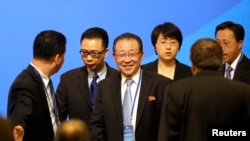BEIJING —
China says North Korea is willing to work with Beijing on restarting six-party talks on its nuclear program. The talks have been stalled since 2008.
In the Chinese capital, authorities hosted Wednesday an international forum marking the 10th anniversary of the start of Korea’s nuclear talks. The forum included attendees from the United States, South Korea, Russia and Japan. The U.S. Embassy in Beijing said it was sending a diplomat to attend merely as an observer.
Kim Kye-gwan, first vice minister of the Ministry of Foreign Affairs and North Korea’s chief nuclear strategist, represented Pyongyang. Ahead of Wednesday’s gathering, China’s foreign ministry said Kim confirmed Pyongyang is willing to work with China on resuming the six-party talks.
Both China and North Korea have pressed for restarting talks aimed at denuclearizing the Korean peninsula. But the United States, Japan and South Korea oppose a restart until Pyongyang makes verifiable attempts to dismantle its nuclear program.
On Wednesday, Kim Kye-gwan called for a resumption of talks without preconditions.
A spokesman for China’s foreign minister was asked to respond to the statement.
Hong Lei said all countries should take constructive attitudes to set a reasonable threshold for resumption of the six party talks.
Since the collapse of the six party talks in 2008, North Korea has conducted a third nuclear test and missile launch.
In August of this year satellite imagery from the U.S. Korea Institute at the Johns Hopkins School of Advanced International Studies indicated North Korea had restarted a reactor capable of producing plutonium for weapons.
U.S. Special Representative for North Korea Policy Glyn Davies said that if the satellite imagery was accurate and North Korea had restarted the reactor, this would be a misstep on the part of the government in Pyongyang because it would violate UN Security Council resolutions. He said that if confirmed, it would be an action the United States would take very seriously.
The United Nations imposed sanctions on North Korea after its nuclear test and missile launch earlier this year. Wednesday’s seminar in Beijing comes one day after a U.N. Commission of Inquiry found widespread human rights violations in North Korea’s prison camp network, where as many as 200,000 people are believed to be held.
In the Chinese capital, authorities hosted Wednesday an international forum marking the 10th anniversary of the start of Korea’s nuclear talks. The forum included attendees from the United States, South Korea, Russia and Japan. The U.S. Embassy in Beijing said it was sending a diplomat to attend merely as an observer.
Kim Kye-gwan, first vice minister of the Ministry of Foreign Affairs and North Korea’s chief nuclear strategist, represented Pyongyang. Ahead of Wednesday’s gathering, China’s foreign ministry said Kim confirmed Pyongyang is willing to work with China on resuming the six-party talks.
Both China and North Korea have pressed for restarting talks aimed at denuclearizing the Korean peninsula. But the United States, Japan and South Korea oppose a restart until Pyongyang makes verifiable attempts to dismantle its nuclear program.
On Wednesday, Kim Kye-gwan called for a resumption of talks without preconditions.
A spokesman for China’s foreign minister was asked to respond to the statement.
Hong Lei said all countries should take constructive attitudes to set a reasonable threshold for resumption of the six party talks.
Since the collapse of the six party talks in 2008, North Korea has conducted a third nuclear test and missile launch.
In August of this year satellite imagery from the U.S. Korea Institute at the Johns Hopkins School of Advanced International Studies indicated North Korea had restarted a reactor capable of producing plutonium for weapons.
U.S. Special Representative for North Korea Policy Glyn Davies said that if the satellite imagery was accurate and North Korea had restarted the reactor, this would be a misstep on the part of the government in Pyongyang because it would violate UN Security Council resolutions. He said that if confirmed, it would be an action the United States would take very seriously.
The United Nations imposed sanctions on North Korea after its nuclear test and missile launch earlier this year. Wednesday’s seminar in Beijing comes one day after a U.N. Commission of Inquiry found widespread human rights violations in North Korea’s prison camp network, where as many as 200,000 people are believed to be held.
